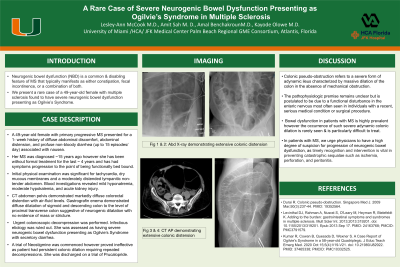Tuesday Poster Session
Category: Colon
P3153 - A Rare Case of Severe Neurogenic Bowel Dysfunction Presenting as Ogilvie’s Syndrome in Multiple Sclerosis
Tuesday, October 24, 2023
10:30 AM - 4:00 PM PT
Location: Exhibit Hall

Has Audio

Lesley-Ann McCook, MD
University of Miami
Atlantis, FL
Presenting Author(s)
Lesley- Ann McCook, MD1, Amit Sah, MD1, Amal Benchakroun, MD2, Kayode Olowe, MD3
1University of Miami, Atlantis, FL; 2University of Miami/HCA Florida JFK Hospital, Lantana, FL; 3HCA Healthcare, Atlantis, FL
Introduction: Neurogenic bowel dysfunction (NBD) is a common & disabling feature of MS that typically manifests as either constipation, fecal incontinence, or a combination of both. We present a rare case of a 49-year-old female with multiple sclerosis found to have severe neurogenic bowel dysfunction presenting as Ogilvie’s Syndrome.
Case Description/Methods: A 49-year-old female with primary progressive MS presented for a 1- week history of diffuse abdominal discomfort, abdominal distension, and profuse non-bloody diarrhea (up to 15 episodes/ day) associated with nausea. Her MS was diagnosed ~15 years ago however she has been without formal treatment for the last ~ 4 years and has had symptoms progression to the point of being functionally bed bound. Initial physical examination was significant for tachycardia, dry mucous membranes and a moderately distended tympanitic non-tender abdomen. Blood investigations revealed mild hyponatremia, moderate hypokalemia, and acute kidney injury. CT abdomen pelvis demonstrated markedly diffuse colorectal distention with air-fluid levels. Gastrografin enema demonstrated diffuse dilatation of sigmoid and descending colon to the level of proximal transverse colon suggestive of neurogenic dilatation with no evidence of mass or stricture. Urgent colonoscopic decompression was performed. Infectious etiology was ruled out. She was assessed as having severe neurogenic bowel dysfunction presenting as Ogilvie’s Syndrome with secretory diarrhea. A trial of Neostigmine was commenced however proved ineffective as patient had persistent colonic dilation requiring repeated decompressions. She was discharged on a trial of Prucalopride.
Discussion: Colonic pseudo-obstruction refers to a severe form of adynamic ileus characterized by massive dilation of the colon in the absence of mechanical obstruction.The pathophysiologic premise remains unclear but is postulated to be due to a functional disturbance in the enteric nervous most often seen in individuals with a recent, serious medical condition or surgical procedure. Bowel dysfunction in patients with MS is highly prevalent however the occurrence of such severe adynamic colonic dilation is rarely seen & is particularly difficult to treat. In patients with MS, we urge physicians to have a high degree of suspicion for progression of neurogenic bowel dysfunction, as timely recognition and intervention is vital in preventing catastrophic sequalae such as ischemia, perforation, and peritonitis.
Disclosures:
Lesley- Ann McCook, MD1, Amit Sah, MD1, Amal Benchakroun, MD2, Kayode Olowe, MD3. P3153 - A Rare Case of Severe Neurogenic Bowel Dysfunction Presenting as Ogilvie’s Syndrome in Multiple Sclerosis, ACG 2023 Annual Scientific Meeting Abstracts. Vancouver, BC, Canada: American College of Gastroenterology.
1University of Miami, Atlantis, FL; 2University of Miami/HCA Florida JFK Hospital, Lantana, FL; 3HCA Healthcare, Atlantis, FL
Introduction: Neurogenic bowel dysfunction (NBD) is a common & disabling feature of MS that typically manifests as either constipation, fecal incontinence, or a combination of both. We present a rare case of a 49-year-old female with multiple sclerosis found to have severe neurogenic bowel dysfunction presenting as Ogilvie’s Syndrome.
Case Description/Methods: A 49-year-old female with primary progressive MS presented for a 1- week history of diffuse abdominal discomfort, abdominal distension, and profuse non-bloody diarrhea (up to 15 episodes/ day) associated with nausea. Her MS was diagnosed ~15 years ago however she has been without formal treatment for the last ~ 4 years and has had symptoms progression to the point of being functionally bed bound. Initial physical examination was significant for tachycardia, dry mucous membranes and a moderately distended tympanitic non-tender abdomen. Blood investigations revealed mild hyponatremia, moderate hypokalemia, and acute kidney injury. CT abdomen pelvis demonstrated markedly diffuse colorectal distention with air-fluid levels. Gastrografin enema demonstrated diffuse dilatation of sigmoid and descending colon to the level of proximal transverse colon suggestive of neurogenic dilatation with no evidence of mass or stricture. Urgent colonoscopic decompression was performed. Infectious etiology was ruled out. She was assessed as having severe neurogenic bowel dysfunction presenting as Ogilvie’s Syndrome with secretory diarrhea. A trial of Neostigmine was commenced however proved ineffective as patient had persistent colonic dilation requiring repeated decompressions. She was discharged on a trial of Prucalopride.
Discussion: Colonic pseudo-obstruction refers to a severe form of adynamic ileus characterized by massive dilation of the colon in the absence of mechanical obstruction.The pathophysiologic premise remains unclear but is postulated to be due to a functional disturbance in the enteric nervous most often seen in individuals with a recent, serious medical condition or surgical procedure. Bowel dysfunction in patients with MS is highly prevalent however the occurrence of such severe adynamic colonic dilation is rarely seen & is particularly difficult to treat. In patients with MS, we urge physicians to have a high degree of suspicion for progression of neurogenic bowel dysfunction, as timely recognition and intervention is vital in preventing catastrophic sequalae such as ischemia, perforation, and peritonitis.
Disclosures:
Lesley- Ann McCook indicated no relevant financial relationships.
Amit Sah indicated no relevant financial relationships.
Amal Benchakroun indicated no relevant financial relationships.
Kayode Olowe indicated no relevant financial relationships.
Lesley- Ann McCook, MD1, Amit Sah, MD1, Amal Benchakroun, MD2, Kayode Olowe, MD3. P3153 - A Rare Case of Severe Neurogenic Bowel Dysfunction Presenting as Ogilvie’s Syndrome in Multiple Sclerosis, ACG 2023 Annual Scientific Meeting Abstracts. Vancouver, BC, Canada: American College of Gastroenterology.
